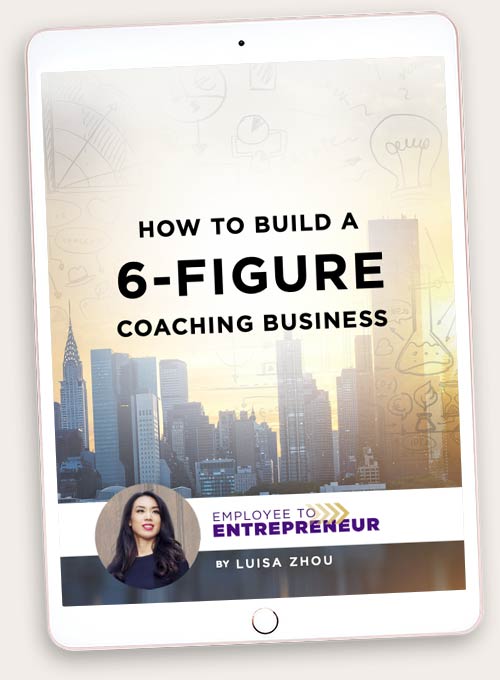What’s the difference between a solopreneur and an entrepreneur? And how can you become a solopreneur yourself?
You’re about to find out.
If you…
- Want to be your own boss – without having to manage employees
- Need a better work/life balance
- Lack purpose in your current job
…then becoming a solopreneur could be an ideal fit.
Sound good? Let’s get started!
Get the Ultimate Guide
for building a
6-Figure Coaching Business so you can achieve more freedom!
What is a solopreneur?
A solopreneur is an entrepreneur who wears all the hats in their business. They’re in charge of everything – from choosing a business idea, launching their offer, marketing, and everything in between.
They don’t have any salaried employees or business partners like an entrepreneur might.
With that said…
Being a solopreneur doesn’t mean you can’t outsource.
In fact, that’s what I do in my business:
I’ve grown to eight figures with no employees, but I HAVE outsourced tasks to contractors to help me scale (and I’ll talk about this more in a bit).

So, keep that in mind: You can be a solopreneur and still get outside help.
The top benefits of being a solopreneur
The top benefits of solopreneurs are:
- Easy to start
- You make all the decisions
- Flexibility
- You choose your clients
- All profits are yours
- You can work from anywhere
Solopreneurs tend to share similar traits. These are…
Key characteristics of solopreneurs
What does it take to become a successful solopreneur?
For one thing, you should be self-motivated because you might not see tangible results for a while.
(Don’t ask me how I know… I built several businesses that flopped before finally seeing serious growth.)
Ultimately, you need to have the discipline to work on your business long-term – without needing anyone to push you.
Remember: As a solopreneur, you’re accountable to yourself, not a boss.
And if you come from an employee background, like I did, this will require a mindset shift.
Chances are, you have limiting beliefs that could hold you back (and I’ll give you an example in a minute).
What is the biggest difference between solopreneurs vs entrepreneurs?
As a solopreneur, you’re also an entrepreneur. But not all entrepreneurs are solopreneurs.
Let me explain…
The main difference between entrepreneurs and solopreneurs is their long-term vision.
For example, an entrepreneur might start out as a solopreneur but have the goal of eventually hiring employees to expand operations.
Maybe they want to open a chain of stores or sell internationally.
On the other hand, most solopreneur don’t want to grow a huge business (as I’ll explain more later on).
For now, here are a few key differences between solopreneurs and entrepreneurs:
| Solopreneurs: | Entrepreneurs: |
| Run their business on their own | Have a team |
| Focus on a specific offer | Expand their offers |
| Pay themselves | Manage payroll |
| Require minimal workspace | Can require considerable workspace |
Solopreneurs focus on one thing
Instead of offering many different services, like an agency would, solopreneurs focus on one specific niche offer.
For example, if you’re a wedding photographer, you’re going to focus on delivering quality wedding packages for your clients – versus expanding your operations beyond what you can handle.
Solopreneurs have less risk
If you’re risk averse (like me!), solopreneurship is a lot safer than entrepreneurship.
Why? Because as a solopreneur, you don’t have to worry about getting outside funding or pouring a lot of your own money into an idea that may or may not work.
If you choose a tried-and-tested business model that offers a high ROI and low overhead (think coaching or consulting), you can get started a lot faster – with a lot less risk.
Get the Ultimate Guide
for building a
6-Figure Coaching Business so you can achieve more freedom!
Solopreneurs often work in their business
As a solopreneur, you’d generally work in your business – rather than managing it, like an entrepreneur might.
But again…
You don’t have to work 24/7 as a solopreneur. For example, even though I still coach, I’ve outsourced a lot of tasks to free up more of my time.
Solopreneurs don’t always look to grow their business
Instead of massively expanding their operations, solopreneurs build flexible businesses they can manage themselves, with little or no outside help.
And keep in mind…
Just because solopreneurs don’t hire salaried employees or build huge teams doesn’t mean they can’t scale or make great money.
Because… they can.
And offering coaching or consulting is a great way to get there, especially since you can use courses and group coaching to scale – without adding to your workload.
As I talk about here:
Being a solopreneur comes with its own challenges.
What are they?
That’s what we’ll look at next.
The top challenges of being a solopreneur
The biggest challenges of being a solopreneur are:
- Responsibility: You have to be on top of all of your income and manage all your to-do’s – your business depends on you
- Cash flow: You typically don’t have outside funding, so you need to have cash in the bank to make investments
- Isolation: You work alone and if your business is online, you don’t have a lot of in-person interaction
- Trading time for money: If you stop working, your business stops, too
Fortunately, there are ways to overcome these.
The first step is to choose the right business idea – and that’s what we’ll look at next.
The best solopreneur ideas
Here are the best ideas that’ll help you hit the ground running – so you can make money faster and ultimately quit your job.
Coaching and consulting
As a coach, your job is to offer actionable advice that helps your clients reach specific goals.
So, instead of doing the work for your client, you’re using your experience to guide them to the results they’re after.
I’m a bit biased about coaching because I know firsthand what an effective business model it can be. Thanks to coaching, I earned over $100k in four months – and that was before I quit my 9-5.

Think of it this way: If you offer three months of coaching for $1,500, you won’t need many clients to replace a full-time income.
Wondering how to create a coaching package? I outline everything here.
Freelancing
If you have specific, in-demand skills, freelancing is one of the easiest ways to become a solopreneur.
For example, let’s say you’re a graphic designer working a typical 9-5.
But… you don’t like having to work in an office. Or maybe you want more control over when you work and how much you get paid.
In that case?
You could use your skills to go freelance and build your own client base using sites like Upwork or asking your network for referrals.
A lot of solopreneurs (like me!) turn to freelancers when they need to offload tasks, and it’s a great way to replace your salary quickly.
Online courses
If you like the idea of having a huge impact on people’s lives while ALSO earning passive income to free up your time, online courses are the way to go.
What can you teach? Basically anything – from marketing to piano.
And the thing is, you DON’T need a massive audience to make money with online courses.
What you do need is the right audience: People who are excited about what you offer because it speaks specifically to their needs or wants.
Example: I made over $8k in course sales with an audience of 200 people, so I know firsthand what works:
E-commerce store
E-commerce can be a lucrative way to become a solopreneur. In fact, the e-commerce market size is worth $8.8 trillion.
With that said…
Selling physical products does come with much higher overhead costs: You need to choose a product to offer, buy inventory, and deal with shipping.
All told, you’d be looking at a $40,000 investment to get your business up and running.
So, though e-commerce absolutely can be a good option, do your research first to know what expenses you can expect.
Get the Ultimate Guide
for building a
6-Figure Coaching Business so you can achieve more freedom!
How to become a solopreneur (4 steps)
Okay, now that we’ve talked about some great solopreneurship ideas, how can you actually become one?
You’re about to find out.
Find a niche
To be a successful solopreneur, you need a niche. That means you have to target a specific market segment rather than everyone.
For example, let’s say you want to become a health coach.
Great! The thing is… that’s really broad. And because it’s really broad, it doesn’t speak to anyone in particular.
Think of it this way…
If you were a retiree looking for a coach who could help you lose weight, what would you prefer:
Working with someone who says, “I help everyone improve their health” or someone who says, “I help retirees build customized workout programs based on their unique metabolism.”
Chances are, you’d go with the second coach.
And that’s the power of niching down: It helps you speak directly to your target audience and address their specific challenges.
So, bottom line: Think of problems people have that you could solve.
Once you’ve identified a niche, the next steps will be a lot simpler because you’ll know who you’re trying to attract.
Get your first paying clients
How can you land clients?
There are all kinds of ways depending on your niche, your budget, and what speaks to you most.
For example, if you’re a coach, getting interviewed on niche podcasts can be an effective way to get your name out there among your target audience.
But maybe you’re wondering, “Luisa, that sounds great, but… I don’t know how to get podcast interviews.”
Don’t worry, I’ve got you covered.
To find podcasts in your niche, try using these queries in any search engine:
- “Podcast” + “[Your Niche]”
- “Top [Your Niche] podcasts in [Year]”
Once you find relevant podcasts, here’s a template you can customize and send to podcast hosts:
Hi [Podcaster’s Name],
I’m [Your Name] and I [briefly talk about what you do that would interest the podcast host/their audience]. Based on your listeners’ interests, here are a few podcast ideas that I think your listeners would enjoy:
- [Topic suggestion 1]
- [Topic suggestion 2]
- [Topic suggestion 3]
Do any of these topics speak to you? If so, please reach out and we can discuss this further.
Warmly,
[Your Name]
Appearing on niche podcasts is great because you instantly get exposed to people who might be looking for what you offer.

But there are also plenty of other ways you can land clients, like engaging in niche social media groups (think Facebook and Reddit), running ads, and promoting your business through LinkedIn.
Not all of these strategies are created equal, though.
If you’re just starting out, some will work a lot better than others (for example, LinkedIn will give you faster results than paid ads).
I cover all of these strategies (and a lot more!) in detail here.
Build systems
Once you have some business experience under your belt, you’ll want to create systems that’ll help you automate tasks and scale.
For example, sales are essential to having a successful solopreneurship because, without them, you won’t have a business.
That’s why creating a system for getting sales is so important. For this step, you can use things like email marketing, sales pages, and webinars.
And when you’re creating these materials, think: Is this content reusable?
If so, you’re on the right track to creating a business that gives you true freedom.
Here’s a disclaimer, though: Building systems is important, but so is timing.
You’ll know you’re ready to systemize things like lead generation and sales when you’re making consistent income month to month and know what’s working consistently.
Work on your mindset
As I mentioned earlier, you might have limiting beliefs right now that could hold you back as a solopreneur.
For example, maybe you have a tendency to think, “This is too hard” or “I can’t do this” when you’re faced with a task you’ve never done before.
In that case? Get in the habit of reframing your thoughts.
Like this: “I have everything I need to figure this out” or “There are many ways to solve this problem and I just have to find one that works for me.”
Get the Ultimate Guide
for building a
6-Figure Coaching Business so you can achieve more freedom!
Yes, this exercise is easier said than done.
But the more you actively reframe your thinking and replace negative thoughts with positive ones, the more you’ll grow.
Ultimately, having a growth mindset can open a lot of doors for you.
Take it from me: I went from being a salaried employee to building a thriving business, and changing my mindset was a key to getting there.
Solopreneur examples
Okay, now that we’ve looked at how to become a solopreneur, let’s look at some real-life examples.
Luisa Zhou

First up… Hi, I’m Luisa. I used to be a Princeton-trained engineer, but I wanted more freedom and meaning than my 9-5 offered.
Long story short, I built a few businesses on the side until eventually, my work paid off and I made over $100k in four months as a coach – before quitting my job.
As I talked about briefly, I’ve never had employees, though. Not one.
Instead, I put together a small team of freelancers who helped me…
- Focus on things only I could do
- Work fewer hours
- Scale to eight figures
Ultimately, my business is one example (out of many) that shows you can be a long-term solopreneur and STILL have a huge impact.
Jackie Aina

Jackie Aina is a prime example of successful solopreneurship:
Thanks to her background as a makeup artist, she became a beauty influencer to a niche audience (women of color).
And it works: She has millions of fans and partners with major brands like Sephora.
Farnoosh Torabi

Farnoosh Torabi is a best-selling author, podcaster, and personal finance expert. But… not so long ago, she was a penniless 22-year-old living in NYC.
In other words? She’s relatable.
And because she chose a specific niche, she’s been able to focus on helping a specific demographic – while building a name for herself as the go-to expert in the personal finance world.
What’s next?
So, there you have it!
Now you know the key differences between solopreneurs and entrepreneurs.
If the idea of building a streamlined business that’s profitable (WITHOUT being overwhelmingly big) appeals to you, just know it’s possible.
I’ve done it, and I’ve helped thousands of students start their own successful solopreneurships too.
If you’re disillusioned by your “safe” 9-5 and want more purpose, money, and free time, here’s everything you need to know to build a solopreneurship that will give you that life:

Want to Build a 6-Figure Coaching Business So You Can Achieve More Freedom?
When you sign up, you’ll also receive regular updates on building a successful online business.
Read more:
How to Start a Side Business from Home (+ Pick One)
How to Escape the 9-5 and Build Financial Freedom








